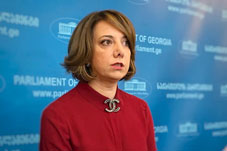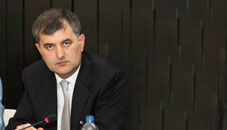
Georgia’s Opposition Wants Sharp Cuts to the Bureaucracy Amid Gov’t Reshuffle
By Gvantsa Gabekhadze
Thursday, November 16
(TBILISI) – On Wednesday Georgia’s leading opposition parties demanded that the government start making significant cuts to the state’s bloated bureaucracy as part of a major structural reshuffle announced by Prime Minister Giorgi Kvirikashvili late last week.
The nation’s two leading opposition parties - the United National Movement (UNM) and European Georgia – offered an immediate rebuke of Kvirikashvili’s proposal to reduce the number of ministries from 18 to 14, saying the plan has an “artificially inflated high price tag.”
Both the UNM and European Georgia claim Kvirikashvili had little input in crafting the details of the proposal, but was instead simply acting as a public relations officer for reclusive billionaire and former Prime Minister, Bidzina Ivanishvili, whom the UNM and European Georgia labeled “the real ruler” of the country.
Ivanishvili, a business tycoon who made millions in Russia during the chaotic post-Soviet privatization period of the 1990s, served as Prime Minister from 2012-2013 before voluntarily stepping down in favor of his handpicked successor.
As the country’s richest man, Ivanishvili founded the ruling Georgian Dream (GD) coalition in April 2012 after spending most of his adult life in Moscow. He and the Georgian Dream ousted his political arch-enemy Mikheil Saakashvili six months later and have held a tight grip on power ever since.
Critics of the changes say the plan to overhaul the structure of the government were hastily drawn up by the Georgian Dream. Most importantly, they claim the proposals were conceived as part of an effort to consolidate the GD’s control over all state agencies.
The opposition also charges that the government is already breaking with its own annual draft budget for 2018, which includes expenses for 18 ministries.
“The draft budget (for 2018) was formally presented several weeks ago (by the government) and no one planned any fundamental changes. This proposal by Kvirikashvili raises a lot of questions about how the state budget will be affected. If the current budget isn’t adjusted, there will be severe financial consequences,” said UNM member Salome Samadashvili, before adding that the Parliament will have a range of tough questions for the incoming cabinet in light of the government’s plan to cut and merge several key positions.
“We will have a series of pointed questions for the new Interior Minister, Giorgi Gakharia, who has no experience in this field. We’ll have just as many tough questions for newly-named Finance Minister, Mamuka Bakhtadze. We (the opposition) have serious questions about his track record with Georgian Railways, which experienced record losses under his watch,” Samadashvili added.
European Georgia MP Sergo Ratiani claimed the main opposition parties have for years demanded severe cuts to the state bureaucracy and its growing costs in favor of increasing pensions and improving social services.
“When the government presented the (latest) draft budget they said that monthly pensions would only increase by 20 GEL and wouldn’t reach 200 GEL per month until 2019,” said Ratiani.
Kvirikashvili has responded to criticism of his plan by stating that the moves will ensure “better management” of state agencies, without having to cut bureaucratic expenses.
“Better management will guarantee higher quality work,” Kvirikashvili said earlier in the week.
Sozar Subari, who serves as Georgia’s Minister for IDPs and Refugees, said very little of the state’s expenses would be significantly reduced as “the government spends far more on projects rather than salaries.”
Political analyst Ramaz Sakvarelidze believes the reshuffle is “too late in coming,” saying most of the proposed cuts should have happened years earlier.
“Several years ago the Ministry for European and Euro-Atlantic Integration was created for only one person. The Ministry was completely useless, redundant … the foreign ministry is responsible for all European and foreign policy issues,” Sakvarelidze said.
“It’s completely logical that the Energy and Economy Ministries have been merged. However, the energy field is very active in Georgia and after some time it may need to be a separate Ministry again,” Sakvarelidze added.
The government’s announced changes will need to be approved by the Georgian Dream-dominated Parliament before officially coming into law.


